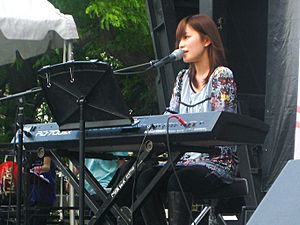Ai Kawashima facts for kids
Quick facts for kids
Ai Kawashima
|
|
|---|---|

Ai Kawashima performing at Japan Day 2009 in Central Park, New York City
|
|
| Background information | |
| Birth name | 川島 愛 |
| Born | February 21, 1986 Fukuoka, Japan |
| Genres | J-pop |
| Occupation(s) | Singer-songwriter, pianist |
| Years active | 1999–present |
| Labels | Tsubasa, Sony Music Japan |
| Associated acts | I Wish |
Ai Kawashima (川嶋 あい, Kawashima Ai, born February 21, 1986) is a talented Japanese pop singer, songwriter, and pianist. She is known for her beautiful music and her kind heart. Ai Kawashima has performed many times on the streets, sharing her songs with people. She also works hard to help children, especially those who have faced challenges like she did.
Contents
Ai Kawashima's Early Life
Ai Kawashima was born in Fukuoka, Japan. When she was very young, her mother became ill and passed away when Ai was just three years old. Her father was not around, so she went to live in an orphanage. Later, she was adopted by the Kawashima family. They owned a construction company.
Sadly, her foster father died when she was ten. After finishing middle school, Ai moved to Tokyo. Her foster mother also passed away when Ai was sixteen. Ai started playing the piano at age three. Even with these difficulties, she dreamed of becoming a singer.
Ai Kawashima's Music Career
Ai Kawashima began her music journey as an enka singer. When she was about ten years old, she even performed on stage at the famous Carnegie Hall in New York. In 1999, she released her first single, Juu-roku Koi Gokoro / Anata ni Kataomoi. However, these early songs did not sell well.
After this, Ai decided to try something different. She started singing her own songs on busy street corners in Shibuya, Tokyo. She used just a microphone and a radio cassette player. To become well-known, she set a big goal: to perform 1,000 times on the street!
At first, not many people noticed her. But as she kept singing, more and more people stopped to listen. She met people who supported her dream. This hard work led to her big break in 2003. She released the hit song "Asueno tobira" (Door to Tomorrow) as part of a duo called I Wish. This song sold over 900,000 copies!
Ai Kawashima has been performing solo since 2005. Her song "12-ko no Kisetsu" (12 Seasons) even reached the top 10 on the Billboard Hits of the World chart in Japan. She continued her street performances even after becoming famous. In 2005, she reached her goal of 1,000 street performances. She says these performances helped build the foundation for her music. In 2009, she performed at Japan Day in Central Park, New York.
Ai Kawashima's Personal Life and Charity Work
Ai Kawashima cares deeply about helping others. She has used her time and money to build schools in developing countries. So far, three schools have been completed, and her goal is to build 100 schools!
Every year, on August 20, she holds a special concert to remember her mother.
In 2011, after a big tsunami hit Japan, many elementary school students had to stay in a shelter. They comforted each other by singing a song called Tabidachi no hi ni (On the day of departure). They had been practicing this song for their graduation ceremony. When Ai Kawashima heard their story, she visited the students in the shelter. She sang the song with them. Later, she returned to attend their delayed graduation ceremony and sang with them again. The song ends with hopeful words: "Let us bloom from this bud."
Ai Kawashima's Music in Anime and Games
Many of Ai Kawashima's songs have been used in popular anime shows and video games.
- "Zetsubou to Kibou" was the theme song for Shining Force Neo.
- "Compass" was the theme song for the eighth One Piece movie, Episode of Alabasta: The Desert Princess and the Pirates.
- "Kimi no Koe" was the ending theme song for The Place Promised in Our Early Days.
- "Door Crawl" was the theme song for Final Fantasy Fables: Chocobo's Dungeon.
Ai Kawashima has released many singles and albums throughout her career.
See also
 In Spanish: Ai Kawashima para niños
In Spanish: Ai Kawashima para niños
 | Aaron Henry |
 | T. R. M. Howard |
 | Jesse Jackson |

